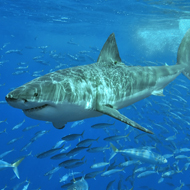Great White Sharks live for 50 years longer than previously thought nuclear bomb study finds

The oldest Great White Shark was previously thought to be 23 50 years younger than the study suggests.
Great White Sharks can live into their 70s and beyond, 50 years longer than previously though, a study has found.
A research paper published in Journal Plos One said that sharks ages had typically been estimated by counting growth bands around their vertebrae.
But the study lead by Li Ling Hamady of the Massachusetts Institute of Technology/Woods Hole Oceanographic Institution, said that assumed that the bands were deposited annually.
The study looked at the vertebrae of eight Great White Sharks taken from the Northwestern Atlantic Ocean (NWA) and took "Advantage of the pulse of radiocarbon above natural levels" produced by the Atom bomb tests of the 1950s and 1960s.
"The rapid rise in radiocarbon in the ocean can be used as a time stamp to determine the age of an organism, the paper said.
That in turn meant the research team were able to estimate the oldest female Great White at around 40-years-old and the oldest male at about 73 years of age.
"These data stand in contrast to earlier studies in the Pacific and Indian Oceans which suggested that the individual white sharks examined were no older than 23-years," said the study.
Read the study in full here.
Image by Terry Goss



 The Veterinary Medicines Directorate (VMD) is inviting applications from veterinary students to attend a one-week extramural studies (EMS) placement in July 2026.
The Veterinary Medicines Directorate (VMD) is inviting applications from veterinary students to attend a one-week extramural studies (EMS) placement in July 2026.